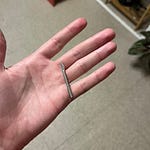Read Part 1 here.
I believe in luck, unfortunately. The kind of person to toss salt, knock wood, converse with a dead god in the bathroom mirror, I’m an unwilling subscriber to a pastiche of cosmic checks and balances in which thought and action hold equal power, ends justify means, and correlation = causation. My world filters through a sieve of Christian-inflected superstition, and I’ve spent a lifetime kneeling over the remains, sifting for fault. There is always fault. It’s a stressful, but uncomplicated, way to live.
Lately, when people joke about doom and apocalypse, as they seem be doing more and more often, my antennae shiver. Though it’s tempting to indulge in this kind of humor—I’m guilty of it myself—to me, it reeks of bad luck. In assuming knowledge of our ultimate end, these jokers display hubris, a thing which by definition cannot go unpunished. With every flip remark about hell on earth, the superstitious among us must wonder if that hell is only being hastened. Maybe it’s the gay plague remix that’s happening as we speak, but the connection between vibes and consequences has never felt stronger.
I guess the jokes scare me. We mustn’t be glib about the crisis, I think, so very virtuously. We must resist the certainty that we’re being led to the slaughter. As if virtue has anything to do with suffering.
In part 1 of this series on gender contagion, I used J.G. Ballard’s Crash to explore the social production of pleasure. In Ballard’s novel, disabling car accidents spawn a cult of perverts who find both purpose and erotic release in physical suffering and high-stakes sexual risk. Looked at one way, Crash, and the 1996 Cronenberg film that’s based on it, offers one non-essentialist view of (sexual) perversion. In the worlds of Crash, the fetish—viewed by the mainstream as an inherently unnatural desire that is acquired, like lice, from an incident or a corruptor—broadens, rather than shrinks, the field of pleasure.
It’s one thing to suggest that social contagion, broadly speaking, need not necessarily be a bad thing. It’s another to claim the same of actual pathogens. Sure, we can look at getting your egg cracked by another tran as value-neutral, but how can you do the same with a literal plague? Though the COVID super-dodgers are dwindling in number, falling ill is the thing we’re all striving to avoid, right?
I’m reminded of an academic paper that I read way back in grad school written by a white settler scholar embedded in a rural community of indigenous Australians. If an outsider spent enough time in this community, they would invariably contract one of its epidemic illnesses, which caused lesions (minor but scarring) on one’s body. While also symptomatic of post- and neocolonial austerity, including lack of access to adequate healthcare, these scars were also visual markers of a community, signaling that the person bearing them was a member, or something like it.
In the paper, the grad student reports that she stayed in her community of study for years, long enough to finally contract the illness herself. Beginning to exhibit lesions of her own, she was more closely, complexly bound to her subjects, understood by the academy as not unlike viruses themselves: living, but not in quite the same way as humans are.
But we’re talking about the social contagion of gender, aren’t we? Gender being what it is, most of us experience ours in different ways at different times. One of the pleasures of being trans, at least for me, is being able to participate in those changes, and to be fascinated by them as they happen. My straight counterpart takes them as they come, like table scraps even, rarely viewing them as anything but inevitable, if they think of them at all. In the straight mind, no one escapes themselves (which is one reason why the high femme, the bimbo, the sex worker, etc., make such able infiltrators). As a transsexual, the amount of work that you do just to make it all happen, and keep it happening while you’re still alive, can make it easy to forget that it’s something that happens to you, too.
As hormones have transformed my physiology, I feel more androgynous than I ever have. I am a woman and a man at the same time, I’ve recently begun to think, and this is actually true, on, like, a material level. In most contexts, my odds of being seen as one or the other are pretty split—and all of that depends on my beholder. When I was younger, this ambiguity made me feel vulnerable (and it certainly does make life riskier). Now that it’s an ambiguity of my choosing, it’s also sometimes fun, and exciting, and sexy, and comfortable. I am both, at least for now. And I think it’s neat that most people pick up on that, as well as interesting how many elect a lane and lean into it, regardless of what my papers, voice, or genitals go on to reveal.
A dykefag knows no single hormonal regimen, but the one I’m currently on has altered my material needs and investments. Expanded them, I should say. I had sex with queer cis men before medical transition, but this new body has made a certain kind of faggotry accessible (to me!) in a way it wasn’t before. With this accessibility comes new pleasures, new connections, new knowings. It also comes with new risks, one of which has been in the news for the past month or so as yet another example of a state-sponsored public health crisis. Even if I never catch one of the illnesses to which gay men have been condemned, I am, in a sense, caught.
But more on that next time.
Find me on Twitter. Cop my second novel, X, right here. It’s NPR’s book of the day today, so here’s your chance to revisit my interview with Death, Sex & Money’s Anna Sale.
Subscribe to support GOOD ADVICE/BAD GAY, DAVID’s advice series from an anonymous gay therapist who’s not afraid to hurt your feelings with the truth. (Sample an unlocked post for a taste of what you’re missing.) 100% of funds go to support a rotating selection of mutual aid and reparations projects.
Want advice? Email badgayadvice@gmail.com for a free 3-month subscription.














